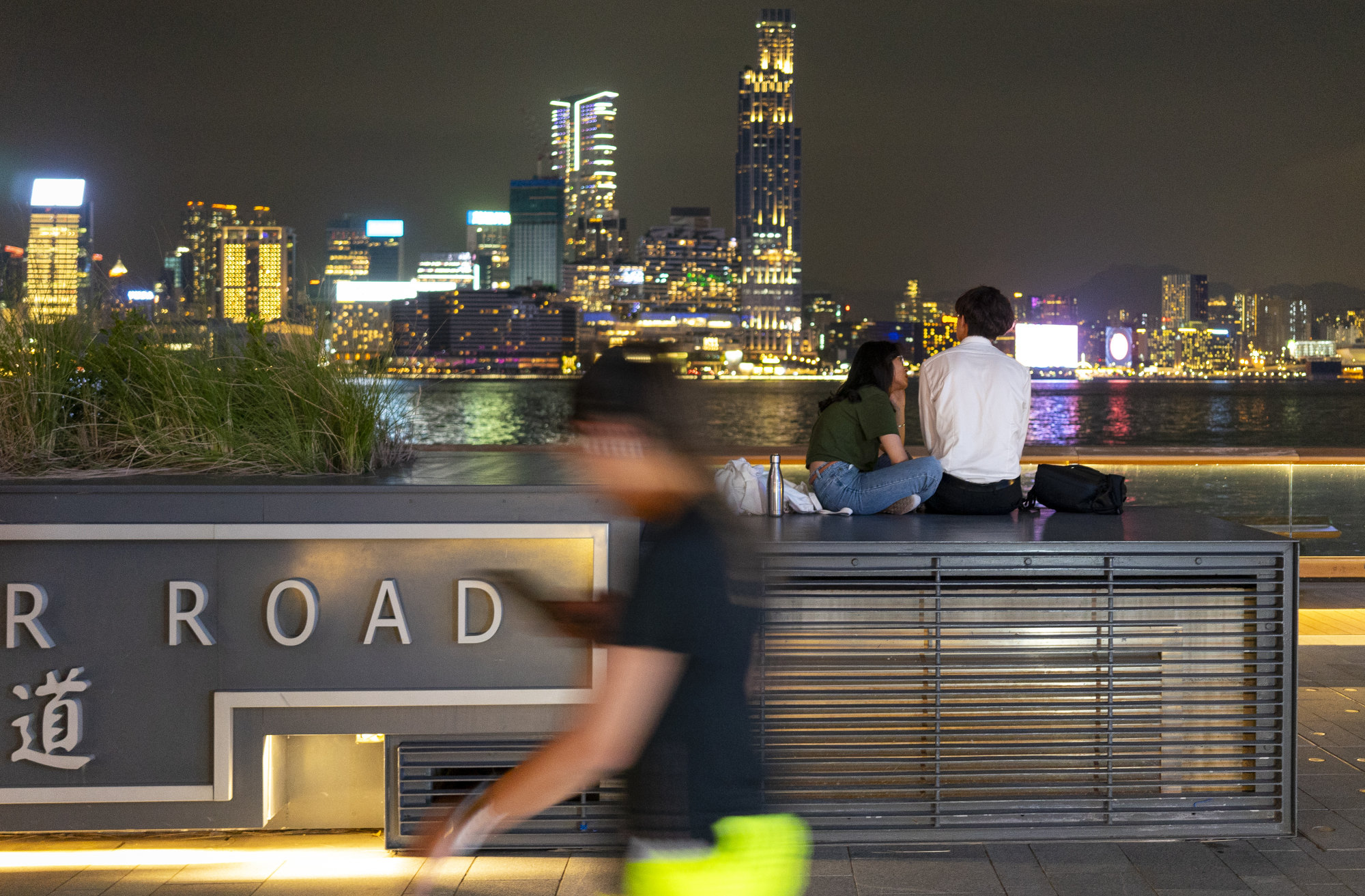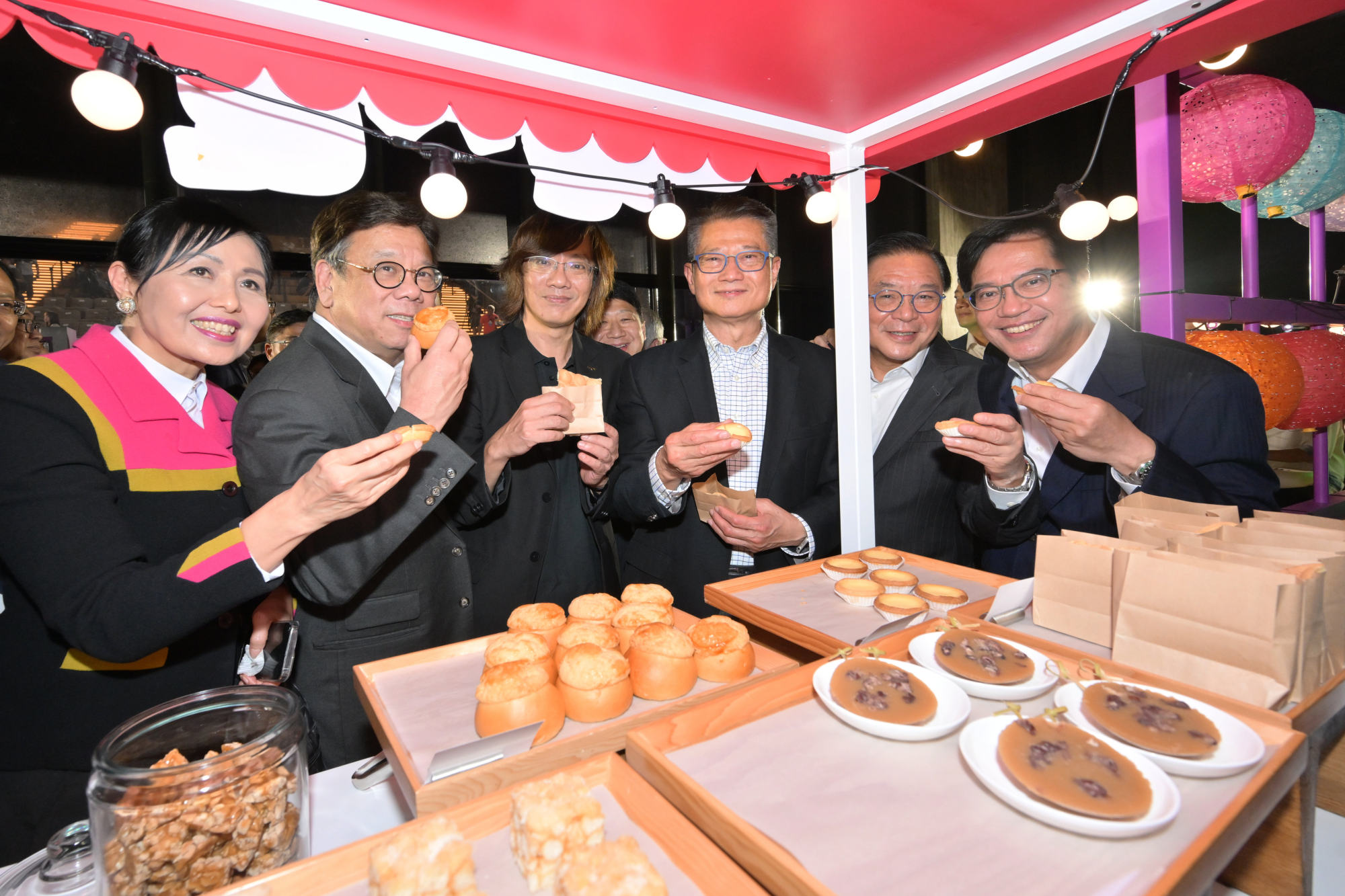
Hong Kong announces waterfront bazaars, theme park activities, free entry to Happy Valley Racecourse and more at launch of nightlife campaign
- Financial Secretary Paul Chan announces host of initiatives including free entry to Happy Valley Racecourse, nighttime film screenings and expanded pedestrian areas
- But some activities for ‘Night Vibes Hong Kong’ campaign are regular events, such as fireworks on National Day and signature Wine & Dine Festival
Waterfront bazaars, evening activities at theme parks and museums, free entry to the Happy Valley Racecourse, film screenings and expanded pedestrian areas were among the highlights of a major campaign to revitalise nightlife announced by Hong Kong’s finance chief on Thursday.
But a number of the included activities are regular events, such as the National Day fireworks, Wine & Dine Festival, Tai Hang Fire Dragon Dance later this month and the New Year’s Eve countdown. Some of these attractions will return for the first time since the pandemic subsided.
“People can go with friends for dining, then for drinks and watch a movie before going home. Families too can have family time to enjoy a series of festivals,” he said at the launch, which took place at M+ museum at the West Kowloon Cultural District.
Hong Kong ‘to host 3 waterfront bazaars’, put on shows under nightlife campaign
Defending the government’s decision to add already established events to the campaign, Chan said all activities should be “innovated and reinvented” regardless of whether they were old or new.
“[We should] inject more vibrancy into them, make them more interesting and attractive so that they are available to more of the general public and bring new experiences,” he said, referring to the regular events.
The finance chief said that although much of society had “returned to normal”, flights and tourists coming to Hong Kong were yet to fully return to pre-pandemic levels. Local consumption also needed additional time to completely recover, he said.

The lifestyle and spending habits of locals had also changed, Chan noted.
“People are going out less and a lot of restaurants and stores are closing earlier,” he said. “Sometimes, things are already quiet by 9pm.”
The campaign aiming to boost the ailing evening economy was announced after Chief Executive John Lee Ka-chiu last week said he had called for reviving the city’s nightlife, emphasising the need for ongoing efforts instead of a one-off event.
Authorities on Thursday said the initial phase of the drive would span several major holidays – the Mid-Autumn Festival, National Day on October 1, Christmas and New Year’s Day, as well Lunar New Year next February.
Hong Kong nightlife campaign ‘must be affordable to keep residents in city’
Other campaign highlights include three night bazaars along the Wan Chai promenade, and the waterfront areas in Kwun Tong and Belcher Bay in Kennedy Town.
Chan said the Tourism Board and stakeholders were discussing ways to rejuvenate the Temple Street night market in Yau Ma Tei.
Three museums in Tsim Sha Tsui – the Museum of Art, Science Museum and Space Museum – will extend opening hours to 10pm from Friday to Sunday and public holidays.
The M+ will organise workshops at night, while the Tai Kwun heritage and arts centre in Central will hold evening performances and art activities over a six-month period.
Special offers will also be provided by about 100 eateries and bars in the Lan Kwai Fong entertainment district.
Simon Wong Ka-wo, president of the Hong Kong Federation of Restaurants and Related Trades, earlier said the Wan Chai bazaar would offer 60 to 70 booths with mostly snacks, light meals, shows and performances, and would tentatively run for 16 days.

He stressed that it was important to ensure the markets would not directly compete with struggling restaurants for dinner business.
Wong also urged authorities to offer subsidies for rent at the bazaars to attract art groups and individual artists, as the current fee of about HK$20,000 (US$2,600) was too expensive.
But Secretary for Development Bernadette Linn Hon-ho said many vendors at the bazaars were not required to pay rent.
Ocean Park and Disneyland, the two major theme parks in the city, will also offer night shows and Halloween events, while various shopping centres such as Langham Place in Mong Kok, Times Square in Causeway Bay and those under Henderson Land, Sino Group and Sun Hung Kai Properties will participate by putting on shows and offering discounts.
‘Night Vibes Hong Kong’ campaign aims to inject some energy into economy
To make it easier for residents to commute at later hours, the MTR Corporation will offer passengers a free trip for every five rides after 10.30pm.
Former financial secretary Antony Leung Kam-chung suggested the city should organise activities that were innovative and could showcase its uniqueness.
Businesses could either lure customers through lower prices or with different services and products than their competitors, he said, adding Hong Kong should focus on the latter.
“There are many things that Hong Kong can develop such as high-end experiences including concerts, international conferences and exhibitions that nearby areas may not be good at,” he said.
“This can attract consumers from areas that do not provide such experiences. Hong Kong should focus on our strengths and amplify them, rather than competing through low costs.”
Light up the night: dragon dances, DJs among Hong Kong’s Mid-Autumn activities
Gary Ng Cheuk-yan, senior economist at Natixis Corporate and Investment Bank, however, said while the government was trying hard to stimulate the night economy, it was probably “hitting the wrong target”.
“The main problem in Hong Kong currently is the lack of confidence, which is related to vanished income and corporate profit growth,” he said, explaining the issue was partially related to consumption-related sectors being hit hard during the pandemic.
“The night economy is only the symptom, not the cause. [The government] should focus on how to attract talent and businesses back [to the city]. Without them, there will be no demand for the night economy.”
He said that until the city found “something unique”, it would face stiff competition from across the border and countries such as Japan.
Additional reporting by Sammy Heung
